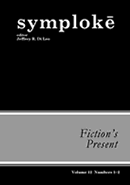
Volume 12, Numbers 1-2

The creative and critical responses to the questions in this issue engage the aesthetic, political, philosophical, and cultural dimensions of fiction at present. Conversations about fiction’s present are works of creative speculation, the most exciting of which are not uncovering spaces hidden from public view, but creating vistas in which the political, aesthetic and emotional dimensions of contemporary fiction are performed. Examinations of fiction’s present are most informative not when they are defending philosophical distinctions or developing literary classifications, but when they are grappling with topics such as the meaning of “the present” in fiction. This process, if pursued diligently, works to break down traditional divisions of academic and intellectual labor. It compels, for example, the creative writer to become more philosophical, and the philosopher to become more creative.
Contents
R. M. Berry & Jeffrey R. Di Leo
12 Theses on Fiction’s Present
Timothy S. Murphy
To Have Done with Postmodernism: A Plea (Or Provocation) For Globalization Studies
Leslie Scalapino
Fiction’s Present without Basis
Robert L. McLaughlin
Post-Postmodern Discontent: Contemporary Fiction and the Social World
Lidia Yuknavitch
Toward the Edge of the Hermetic: Notes on Raising Fiction from the Dead
Alan Singer
The Self-Deceiving Muse: Fiction and the Rationalistic Dictates of the Present
Brian Evenson
Notes on Fiction and Philosophy
Robert L. Caserio
James, Cather, Vollmann, and the Distinction of Historical Fiction
Lance Olsen
Notes Toward the Musicality of Creative Disjunction, Or: Fiction by Collage
Michael Martone
Mount Rushmore: Four Brief Essays on Fictions
Sue-Im Lee
Recognition as a Depleted Source in Lynne Tillman’s Motion Sickness
Percival L. Everett
A Modality
Raymond Federman
Critical Reflections on the Pathetic Condition of the Novel in Our Time
Ronald Sukenick
Henry Miller to Henry James
Jerome Klinkowitz
In Their Own Words: The Collective Presents Itself
Carole Maso
World Book
Carol Becker
Interdisciplinarity
Vincent B. Leitch
Postmodern Theory of Technology: Agendas
Moshe Gold
Serious Play: Derrida and Whitman in the Theory Classroom
Zahi Anbra Zalloua
Foucault as Educator: The Question of Technology and Learning How to Read Differently
David B. Downing
The Double-Edged Sword of Affiliation: Progressive Alliance or Disciplinary Bondage
Paul Smith
Precarious Politics
Walter R. Jacobs
After-Whiteness Studies
Stephen Watt
Notes on a “Classic”
Christian Moraru
Modernism, Deconstruction, Derrida: New Reference Tools
Jed Deppman
Modernism and Melancholia